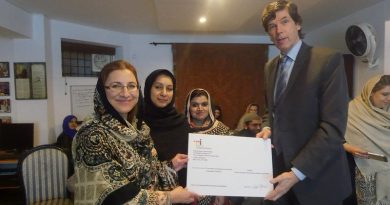Kazuya Mori, Japanese Diplomat, Visits Seton Hall
Charlotte Sens
Layout Editor
On the bottom floor of Seton Hall University’s Walsh Library on April 11, Japanese diplomat Kazuya Mori addressed students, discussing the topic: “Japan around you and why it matters to the world.” Many Japanese language students were in attendance, looking over a table of Japanese tourism brochures and practicing their language skills in conversation with their classmates. Mori began his talk with a resounding “Ohayōgozaimasu.” He shared that now is the perfect time to study US-Japan relations, amidst Japanese Prime Minister Fumio Kishida’s visit with United States President Joe Biden in Washington, D.C in early April.
The career diplomat went on to discuss his experience growing up in the U.S. Mori grew up in Santa Monica, California in the 1980s during the rise of the Japanese economy. He compared Japan’s rise to that of China’s currently, and noted that, paralleling today, many feared that Japan’s rising economic power may challenge that of the U.S., seeing the nation as not only an economic, but also a cultural threat. This fear was aided by the end of the Cold War and the fall of the Soviet Union as Americans began questioning the foreign nation’s rise to power and what that might mean for their own security. He describes a period of “Japan bashing” where Japan-made products were looked down upon and seen as cheaper and of lower quality. He also noted that many thought that since Japanese companies were turning such a large profit in America, the nation should make a concerted effort to give back to the U.S. in investments.
While Mori noted that while there was not a great cross-cultural exchange taking place at that time in the U.S., the tide started to shift in the turn of the century. The diplomat describes this time as “Japan passing,” where Japan’s economy began to stagnate just as China began to open and develop substantially. Throughout the past two decades, Japan’s economy has been taken over by China, and then by Germany, making Japan the 4th strongest economy globally. Mori notes that a decline in media coverage occurred in tandem with the nation’s decline, as well as a fall in students of Japan studies in high schools and universities. However, Mori stated that “no news is good news” and that Japan does not make the news “because there is no bad news.”
He marks a steady bilateral partnership between the U.S. and Japan, intending to highlight that “there are good things to share” about Japan. First, Japan has made the largest foreign direct investment for four consecutive years in a row. Japanese companies have also built relationships with local American communities. Mori mentioned that there are 250 Japanese companies operating just in New Jersey alone, a number that has increased in recent years. Finally, he notes a rise in interest in Japanese culture among America’s younger generations, stemming from the popularity of such things as anime, manga, and video games. Mori encouraged continued appreciation for Japanese culture, as it is all around us, encouraging cross-cultural dialogue.
Kazuya Mori did not just visit Seton Hall to discuss Japan’s growing soft power, also taking a moment to discuss the state of Japan-U.S. bilateral relations. Mori notes that the two powers have played a critical role within East Asia and globally. He highlighted the growing and pervasive threat of North Korea to the people of Japan, highlighting the proximity of the two powers, comparing their distance to that of South Orange and Chicago. Mori addressed unilateral attempts to change the status quo in the East and South China Sea, hinting at China’s aggression in these areas and its continued violation of nations’ exclusive economic zones. He stated that peace and stability in the Taiwan Strait is important for the region’s stability.
Beyond these physical security concerns, Mori highlighted Japan’s goals in addressing climate change and economic security, aiming to maintain vital supply chains and orchestrate close bilateral coordination. This bilateral coordination is the reason for Kishida’s current visit to the U.S. Apart from developing U.S.-Japanese ties, the nations have announced a new trilateral framework with the Republic of Korea, which they are calling a new partnership and a “new era” in East Asia. The three powers have been brought together over shared concerns within the region. Mori commented that although Japan’s relationship with Korea has often been strained and the two states have had their differences, the diplomat believes that relations have rapidly improved in past years.
The Deputy Consulate General ended his talk by sharing hope for future cooperation between the U.S. and Japan, saying that “at the end of the day, everything comes down to people-to-people relations.” Mori emphasized Japan’s longstanding good will towards the U.S., explaining that “Japan and its people are very good friends” to the U.S. and its allies. Kazuya Mori left an impact in the Beck Rooms, charismatically encouraging cross-cultural appreciation and understanding.

